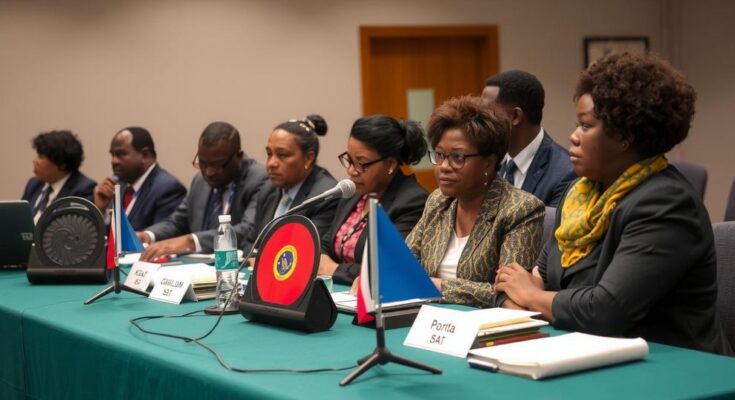The UN Commission on Human Rights in South Sudan has commenced a five-day visit to Kenya to engage with stakeholders on advancing human rights and accountability for violations in South Sudan. Led by Yasmin Sooka and Barney Afako, the delegation will meet government officials and civil society, advocating for transitional justice and a reliable judicial system as essential components of the peace process.
A delegation from the UN Commission on Human Rights in South Sudan has initiated a five-day visit to Kenya, seeking to engage with stakeholders to promote human rights and accountability for violations occurring in South Sudan. Led by Yasmin Sooka, Chair of the Commission, and Barney Afako, a member, the delegation will hold discussions with high-ranking Kenyan officials, international organizations, and civil society representatives.
The dialogue aims to emphasize the critical role of human rights in preventing the worsening of conditions in South Sudan, while also reinforcing justice and accountability’s place within the peace process. The Commission expresses the need for robust regional support for South Sudan’s transition, particularly highlighting Kenya’s significant role as a peace guarantor.
During the visit, discussions will advocate for the establishment of a dependable and independent judicial system in South Sudan, aligning with the Judicial Review Commission’s recommendations. The delegation will also engage with participants of the Tumaini Initiative, a renewed mediation dialogue aimed at reconciling the South Sudanese government with hold-out groups to the 2018 Revitalized Agreement for Resolution of Conflict in South Sudan (R-ARCSS).
The Commission will press for the integration of transitional justice mechanisms within the ongoing discussions to ensure accountability and provide reparations for victims, which are essential for attaining enduring peace in South Sudan. The Commission on Human Rights in South Sudan, established by the United Nations Human Rights Council in March 2016, operates independently, investigating human rights conditions and recommending measures to avoid further deterioration. The Commission offers essential insights through interviews with victims, survivors, and experts, reinforcing its mandate to elucidate facts surrounding human rights violations and clarify accountability.
The UN Commission on Human Rights in South Sudan was established to address the ongoing human rights challenges faced in the country, which has been marred by conflict and governance issues since its emergence as a nation in 2011. The Commission, composed of independent experts, plays a vital role in investigating human rights violations and making evidence-based recommendations for improvements. Periodically engaging with regional stakeholders, the Commission seeks to foster support for South Sudan’s transition and peace process, ensuring that justice and accountability are part of ongoing dialogues.
The UN Commission on Human Rights in South Sudan’s visit to Kenya underscores a concerted effort to enhance regional cooperation in addressing human rights violations and promoting accountability in South Sudan. Through dialogues with varied stakeholders, the Commission aims to reinforce the importance of judicial independence and transitional justice measures, which are deemed crucial for a sustainable peace process. This initiative reflects a proactive approach to not only investigate but also advocate for the rights of the South Sudanese populace.
Original Source: www.radiotamazuj.org




